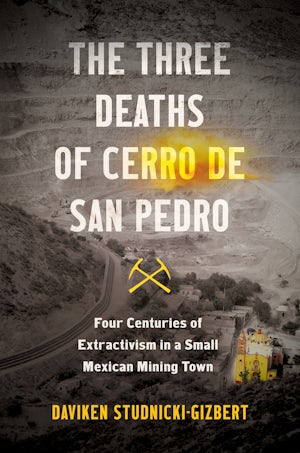The Three Deaths of Cerro de San Pedro
Four Centuries of Extractivism in a Small Mexican Mining Town
By Daviken Studnicki-Gizbert
324 pp., 6.125 x 9.25, 6 halftones, 4 maps
-
Paperback ISBN: 978-1-4696-7110-9
Published: December 2022 -
E-book PDF ISBN: 979-8-8908-6240-2
Published: November 2022 -
Hardcover ISBN: 978-1-4696-7109-3
Published: December 2022 -
E-book EPUB ISBN: 978-1-4696-7111-6
Published: November 2022
Buy this Book
- Paperback $34.95
- Hardcover $99.00
- E-Book $27.99
For Professors:
Free E-Exam Copies
Evolving technology accelerated the flow of matter and energy moving through the extractive systems of exhausted mines and revived profitability over and over again in Mexico's mining districts. Studnicki-Gizbert demonstrates how this serial reanimation of a non-renewable resource was catalyzed by capital and supported by state policy and ideology and how each new cycle imposed ever more harmful consequences on both laborers and natural ecologies. At the same time, however, miners and their communities pursued a contending vision—a moral ecology—that defended the healthy reproduction of life and land. This book's breathtakingly long view brings important perspective to environmental justice conflicts around extraction in Latin America today.
About the Author
Daviken Studnicki-Gizbert is associate professor of history at McGill University and author of A Nation upon the Ocean Sea.
For more information about Daviken Studnicki-Gizbert, visit
the
Author
Page.
Reviews
“As environmental historians, scholars of capitalism, and fellow Latin Americans will note, this book speaks directly of our open veins. . . . Anyone interested in a sweeping (and thrilling) history of extractive capitalism in Latin America should pick up this book without hesitation.”–H-Environment
"The first longue durée environmental history of mining in Mexico—in Latin America, period—this extraordinary book will become a foundational study of extraction on a large historical scale. With a great narrative and detail, it is the whole package. One can hope that students training to become mining engineers will read it, too."—Myrna I. Santiago, Saint Mary's College of California
"Sweeping, ambitious, and engaging, this deep history of a 'small place' reveals how the furies of colonialism and capitalism swept over and through a mining town and left it tattered and scarred. Studnicki-Gizbert provides vital historical and material contexts for understanding—and intervening—in contemporary conflicts over extractivism in Mexico and beyond."—John Soluri, Carnegie Mellon University



